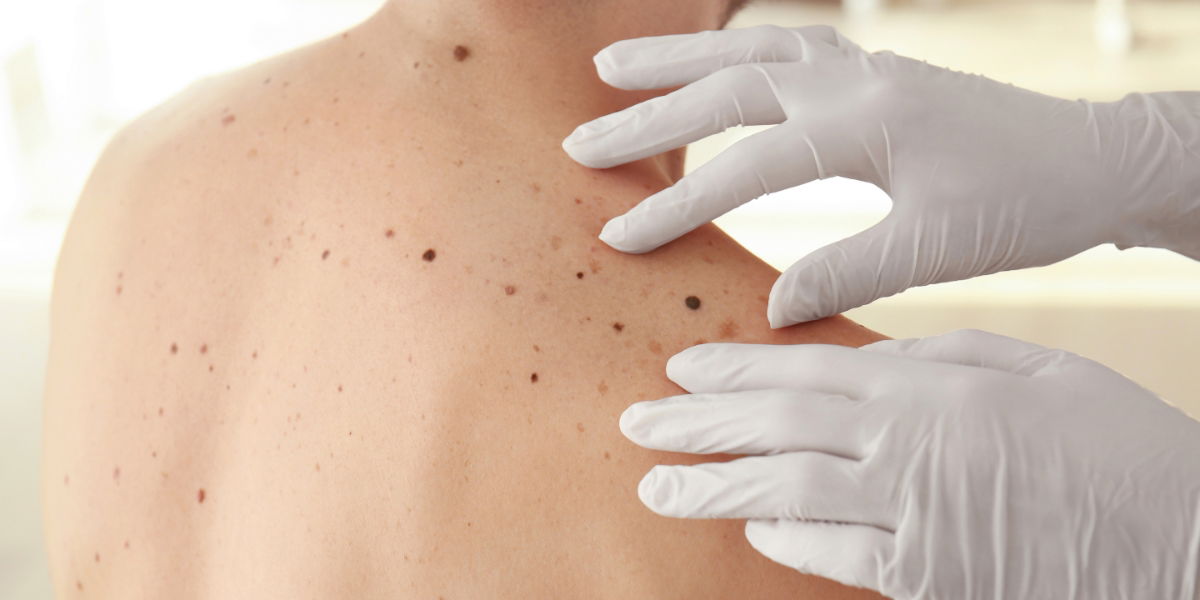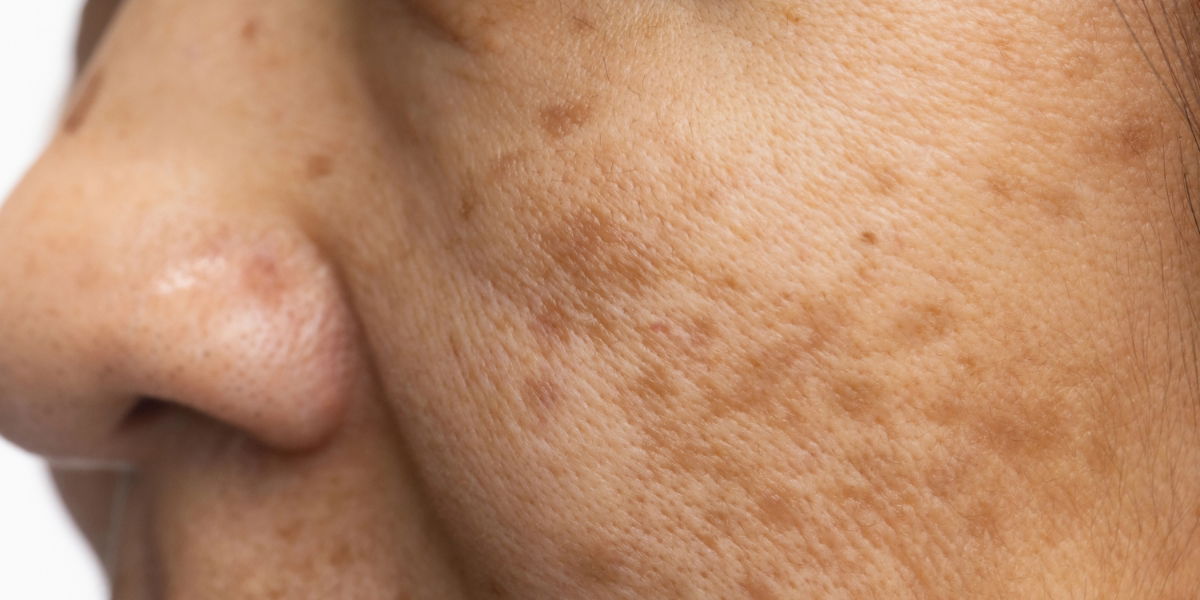
Basal cell carcinoma (BCC) is the most common form of skin cancer, with around 3.6 million cases reported each year in the US alone. Notably, Australian actor Hugh Jackman has had several BCCs removed throughout several years and has used his social media presence to urge people to wear sunscreen every day, no matter the season or weather conditions.
While non-melanoma skin cancers like basal cell carcinoma rarely spread beyond the area where they originally formed, making them highly treatable, BCCs can grow deeper into the skin and may come back in the same spot even after treatment. Thus, it is crucial to catch BCC symptoms and seek treatment as early as possible. Here, we break down what basal cell carcinoma is, what it looks like, how it’s treated, and steps to take to prevent skin cancer.
What Does Basal Cell Carcinoma Look Like?
Basal cell carcinoma most frequently occurs in areas that are often exposed to the sun, such as the face, ears, neck, shoulders, and back. However, BCCs can occur anywhere on the face or body, so it’s important to check everywhere when looking for potential signs of BCCs or other skin cancers.
Basal cell carcinomas tend to have raised or rolled edges and may be indented in the center. They can be particularly tricky to detect, as BCCs often look like small sores, pimples, scars, or scaly patches of skin. Any sores or pimples on your skin that do not go away or heal on their own might actually be an early sign of BCC and should therefore be examined by a dermatologist.
In people with darker skin, BCCs can also be darker in color, resembling a mole, rash, or other non-cancerous skin conditions.

Basal Cell Carcinoma vs. Squamous Cell Carcinoma
Basal cell carcinoma and squamous cell carcinoma (SCC) are the two most common types of non-melanoma skin cancer and can be difficult to tell apart. One of the main differences in physical characteristics between BCC and SCC is that SCC tends to feel raised and rough to the touch, whereas BCC may be smooth or have only raised edges.
In either case, if you notice an odd spot on your skin that appears to be changing in appearance or not healing, you should have it examined by your dermatologist. He or she can accurately diagnose the lesion and recommend appropriate next steps based on the results of diagnostic tests like a skin biopsy.
Who Is Most At-Risk for BCC?
As the most common type of skin cancer in the US, basal cell carcinoma can affect anyone. However, some groups of people have been shown to be at a greater risk of developing BCC than others. These risk factors include:
- Outdoor workers
- Light skin tones, particularly with red hair
- A history of blistering sunburns as children
- A history of using indoor tanning beds
- A personal or family history of BCC
- A personal history of radiation therapy
- Suppressed immune systems
- Certain genetic conditions
What Causes Basal Cell Carcinoma?
As you can see from the risk factors for basal cell carcinoma, a history of repeated exposure to UV light (from both the sun and indoor sources) is one of the biggest risk factors for developing BCC. However, around 20% of BCCs also occur in areas that are not frequently exposed to the sun due to certain medical or genetic conditions or treatments. So while not all BCCs are caused by sun exposure, the majority of cases are connected to UV damage.
As with other types of skin cancer, years of accumulated UV exposure can lead to DNA damage and gene mutations caused by free radicals, leading to the uncontrolled growth of cancerous cells. In the case of basal cell carcinoma, basal cells — skin cells at the bottom of the epidermis that are responsible for creating new skin cells — are affected by this DNA damage.
How Serious Is Basal Cell Carcinoma?
Nearly all cases of basal cell carcinoma can be completely removed when detected and treated early. This is because this type of skin cancer grows very slowly and rarely spreads to other areas of the body, though it can. If left untreated, BCC can cause significant damage to surrounding healthy tissue and can be more likely to recur in the future. In rare cases, BCC can be fatal if left untreated for a long period of time.
How Is BCC Treated?
Basal cell carcinoma is typically easy to treat with a simple outpatient procedure using a local anesthetic. The right BCC treatment technique will depend on the size, location, and severity of the BCC lesion. Treatment options can include:
- Surgical excision
- Curettage and electrodesiccation
- Mohs surgery
- Laser treatments
- Photodynamic therapy (PDT)
When treating small, non-invasive BCCs, healing time and scarring are typically minimal and most people are able to resume normal activities shortly after their procedure.
How to Prevent Basal Cell Carcinoma
There are a number of steps you can take to minimize your risk of developing a new or recurrent BCC. Skin cancer prevention strategies include:
Wearing daily broad-spectrum sunscreen with at least SPF 15.
Avoiding indoor tanning beds and deliberate outdoor tanning.
Keeping up with regular visits to your dermatologist for a yearly or bi-yearly professional skin exam.
Wearing sun-protective clothing and seeking shade when possible.
Regularly checking your skin for suspicious-looking moles or lesions.
Why Feinstein Dermatology
Choose Feinstein Dermatology for unparalleled expertise and care in skin health. With over 15 years of excellence, our commitment to patient satisfaction is evident in the trust of over thirty-five thousand patients. Our team, including Double Board Certified Dermatologist & Mohs Micrographic Surgeon, Dr. Brian Feinstein, on-site Board Certified Reconstructive Plastic Surgeon, and multiple other board-certified dermatologists, we ensure optimal outcomes and set the standard in customer experience. When it comes to dermatological and cosmetic services, trust the authority on skin cancer care—Feinstein Dermatology, where experience matters.

Meet Your Mohs Surgeon
Brian Feinstein, D.O., FAAD – Double Board Certified Dermatologist & Mohs Micrographic Surgeon
Bottom Line
Basal cell carcinoma is a common type of non-melanoma skin cancer and, although highly treatable, can be tricky to spot. Any time you notice a new skin growth or spot or if you have what you think is a sore, pimple, or scar that isn’t healing, it’s best to have it checked by your dermatologist for an accurate diagnosis. When caught and treated early, BCC has a very high cure rate.
If you are looking to establish regular skin exams with an experienced board-certified dermatologist or if you have a suspicious spot you’d like to have examined, please don’t hesitate to call our Delray Beach office at (561) 463-5948 or contact us online to schedule a consultation with one of our skin cancer experts.




